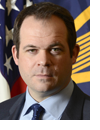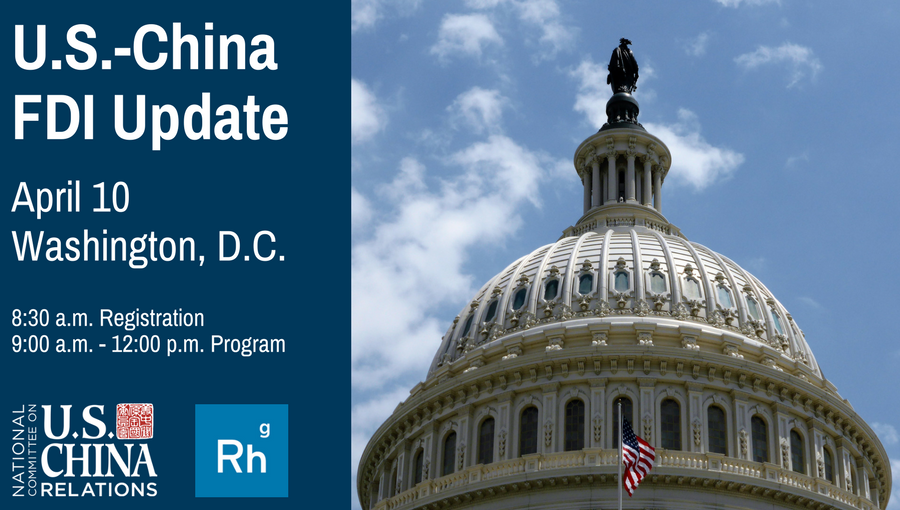Tuesday, April 10, 2018 | 8:30 AM EDT - 12:00 PM EDT
Covington & Burling, LLP |, Washington, DC
After reaching a record $60 billion in 2016, foreign direct investment (FDI) flows between the United States and China have been squeezed into a diminished position by forces on both sides of the Pacific. In 2017, Chinese FDI in the United States dropped by more than one-third as Beijing re-imposed capital controls and Washington toughened screening of high-technology acquisitions; the value of newly announced transactions dropped by more than 90%. The outlook for 2018 is more uncertain still. President Trump has designated China a strategic competitor, a label not applied since 2000, and Washington is contemplating a disruptive array of more restrictive China policies to respond to national security concerns and the perceived lack of reciprocity, including greatly intensifying the investment screening process.
On April 10, 2018, the National Committee on U.S.-China Relations and Rhodium Group hosted an event in Washington, D.C., to release two studies that will shape the public debate on these urgent topics: Two-Way Street, the definitive analysis of U.S.-China FDI trends from 1990 through 2017; and New Neighbors, the seminal analysis of local impacts from Chinese FDI across every U.S. congressional district. With 12 months of brand new data and a number of recent policy developments in both countries, the report authors provided a thorough and timely presentation of research on U.S.-China FDI, followed by a panel discussion with American legal and business leaders.
This event was part of the U.S.-China FDI Project, a multi-year research initiative that aims to provide greater transparency on FDI flows between the United States and China.

Amy P. Celico
Amy P. Celico is a principal of Albright Stonebridge Group (ASG), and leads the firm’s China team in Washington, D.C. Drawing on more than 20 years of experience working on Chinese political and economic issues and developing U.S.-China trade policy positions, Ms. Celico develops and implements tailored strategies for clients, helping them deepen relationships with key stakeholders, succeed with M&A transactions, resolve complex problems, and build and expand their business. Previously, Ms. Celico served as senior director for China affairs at the Office of the U.S. Trade Representative. She also worked at the U.S. Departments of Commerce and State, including as a diplomat stationed in Beijing and Shanghai, as well as in Washington, D.C., in the International Trade Administration and the Bureau of Intelligence and Research. Ms. Celico speaks Mandarin Chinese and remains actively engaged in China and trade policy analysis, serving on the board of directors of the National Committee on U.S.-China Relations, and as a non-resident senior associate at the Center for Strategic and International Studies.

Eric Chewning
Appointed in October 2017, Mr. Eric Chewning currently serves as the Deputy Assistant Secretary of Defense for Manufacturing and Industrial Base Policy (MIBP). In this capacity, he is the principal advisor to the Under Secretary of Defense for Acquisition and Sustainment (A&S) for analyzing the capabilities, overall health, and policies concerning the industrial base on which the Department relies for current and future warfighting capabilities and requirements. MIBP is also responsible for developing the Department’s position on the business combinations and transactions, both foreign and domestic, that shape and affect national security.
Mr. Chewning has over 17 years of experience advising decision makers in military-industrial markets. Prior to his assignment with the Office of the Secretary of Defense, he was a partner with the global management consulting firm McKinsey & Company, where he worked alongside financial sponsors and corporate leaders in the global aerospace, defense, government services, and space industries.
Mr. Chewning’s analysis of foreign policy, military strategy, and the defense industrial base has been featured in a variety of national media outlets, including: American Interest, Defense News, Military Review, and War on the Rocks. A former U.S. Army officer, he served as the tactical intelligence officer for the 1st Battalion 5th Cavalry Regiment and as a strategic intelligence officer at the National Ground Intelligence Center (NGIC). He is a veteran of Operation Iraqi Freedom and participated in the evacuation of New Orleans during Hurricane Katrina.
Prior to his military service, Mr. Chewning was an investment banker at Morgan Stanley & Co. where he focused on corporate finance and mergers & acquisitions in the global industrials sector. He received an MBA from the Darden School of Business at the University of Virginia where he was recognized as a Shermet Scholar. He also earned an MA in international relations and BA with honors from the University of Chicago.

David Fagan
David Fagan co-chairs Covington’s top ranked practice on cross-border investment and national security matters, including reviews conducted by the Committee on Foreign Investment in the United States (CFIUS), and also leads the firm’s cyber and data security incident response practice. Mr. Fagan is rated by Chambers USA and Chambers Global for his leading expertise in CFIUS matters and privacy and data security, and was named as a Dealmaker of the Year by The American Lawyer for 2016.

Steven R. Foland
Steven R. Foland is currently managing director and head of banking, Americas, for China International Capital Corporation (CICC). Mr. Foland has approximately 25 years of investment banking experience, including 15 years in Asia. Steven was formerly head of the Asia Investment Banking Group and co‐head of Software Banking at Stifel, head of technology banking for non‐Japan Asia for Credit Suisse, and held various positions with Morgan Stanley in both New York and Hong Kong.

Thilo Hanemann
Report author Thilo Hanemann is director of Rhodium Group’s cross-border investment practice. His research assesses new trends in global trade and capital flows, related policy developments, and the political and commercial dynamics of specific transactions. Mr. Hanemann’s most recent work focuses on the evolution of China’s international investment position, and the economic and policy implications of this new trend. He is a frequent speaker and commentator on China’s outward investment and has published numerous reports and articles on the topic. He is also a senior policy fellow at the Mercator Institute for China Studies, Europe’s biggest China think tank, located in Berlin.

Kenneth Jarrett
Kenneth Jarrett has been president of the American Chamber of Commerce in Shanghai since September 2013. Prior to that he was the Greater China Chairman for APCO Worldwide, a Washington-based public affairs consultancy from 2008 to 2013, and before that a U.S. diplomat from 1982 to 2008. During his 26-year diplomatic career, his postings included consul general in Shanghai, deputy consul General in Hong Kong, and director of Asian Affairs at the White House National Security Council. He also served in Beijing, Chengdu, Singapore, and had several assignments in Washington, D.C. Mr. Jarrett has degrees from Cornell University, Yale University and the National War College. He is the recipient of the Magnolia Award (Silver) from the Shanghai government and is a member of the National Committee on U.S.-China Relations.

Alan P. Larson
Alan P. Larson is senior international policy advisor at Covington, where he provides clients with strategic advice, counseling and representation at the intersection of international business and public policy. A Ph.D. economist, decorated diplomat and non-lawyer, Mr. Larson advises clients on high stakes international challenges. His trouble shooting takes him to all parts of the world. His practice encompasses international investment and acquisitions; sanctions and trade compliance; international energy transactions, international aviation and international trade. He has helped win approval of the U.S. Committee on Foreign Investment in the U.S. (CFIUS) for some of the highest profile foreign investments in the United States, including several by state-owned companies and sovereign wealth funds.

Stephen A. Orlins
Stephen A. Orlins has been president of the National Committee since 2005. Prior to that, he was the managing director of Carlyle Asia and the chairman of the board of Taiwan Broadband Communications, one of Taiwan’s largest cable television and high speed internet providers. Prior to joining Carlyle, Mr. Orlins was a senior advisor to AEA Investors Inc., a New York-based leveraged buyout firm, with responsibility for AEA’s business activities throughout Asia. From 1983 to 1991, Mr. Orlins was with the investment banking firm of Lehman Brothers where he was a managing director from 1985 to 1991. From 1987 to 1990, he served as president of Lehman Brothers Asia. From 1976 to 1979, Mr. Orlins served in the Office of the Legal Advisor of the United States Department of State, first in the Office of the Assistant Legal Advisor for Political-Military Affairs and then for East Asian and Pacific Affairs. While in that office, he was a member of the legal team that helped establish diplomatic relations with the People’s Republic of China. Mr. Orlins is a magna cum laude graduate of Harvard College and earned his law degree at Harvard Law School. He speaks Mandarin Chinese and is a member of the Council on Foreign Relations.

Daniel H. Rosen
Report author Daniel H. Rosen is a founding partner of Rhodium Group and leads the firm’s work on China. Mr. Rosen has more than two decades of experience analyzing China’s economy, corporate sector and U.S.-China economic and commercial relations. He is affiliated with a number of American think tanks focused on international economics, and is an adjunct associate professor at Columbia University. From 2000–2001, Mr. Rosen was senior adviser for international economic policy at the White House National Economic Council and National Security Council. He is a member of the Council on Foreign Relations, and board member of the National Committee on U.S.-China Relations.
